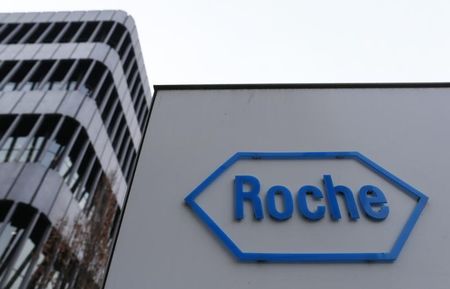By Caroline Copley and Ben Hirschler
LONDON (Reuters) - Roche (VX:ROG) Chief Executive Severin Schwan likes to crack open the champagne with his drug research teams at the end of a big project - especially when they fail.
As the boss of one of the world's most successful pharmaceutical companies, whose leading position in cancer treatments has propelled its market value to more than $250 billion (153.17 billion pounds), it might seem a strange response.
But a celebration to mark the lessons learned from a failed experiment are an important component of Schwan's drive to encourage risk-taking in an intrinsically risky business, where nine out of 10 potential new drugs turn out to be flops.
"We need a culture where people take risks because if you don't take risks, you won't have breakthrough innovation," he told Reuters in an interview. "So we have a big celebration lunch - and we call it a celebration lunch."
Schwan has headed Roche since 2008 but he is quick to point out that the successes the company enjoys today - in the form of three $6 billion plus-a-year cancer drugs - reflect the work of predecessors, given the time needed to develop new medicines.
So his task is to create the environment today for the successes of tomorrow - a process that starts with a decentralised research and development structure, designed to give the company's scientists a creative free rein.
The notion of empowering staff to take risks is not new and has been championed particularly in Silicon Valley, where Roche has an important base via its Genentech biotechnology unit. Other drugmakers, including Eli Lilly (N:LLY), have espoused the idea in the past.
But the issue of creativity is particularly sensitive at Roche given widespread fears in 2009 that the men in suits in Basel would stifle Genentech's free-wheeling culture when they bought out the rest of the company for around $47 billion.
Schwan, however, has kept the drugmaker's individual research operations on a long leash and imported some of Genentech's risk-taking culture into the broader business.
Unlike other pharmaceutical groups, Roche does not have an omnipotent research head. Instead, the heads of its Roche, Genentech and Chugai research operations report directly to Schwan, who is a lawyer by training, not a scientist.
"I would argue, from a cultural point of view, it's more important to praise the people for the nine times they fail, than for the one time they succeed," Schwan said.
"You really have to take care of the nine guys who worked as hard, had as bright ideas and unfortunately failed, and therefore in this sense you should celebrate failures, nine times more than success."
BETS BEYOND CANCER
There have been a few occasions for champagne failure lunches in 2014, both in Roche's core cancer area, where its MetMab drug failed in lung cancer, and in new fields like neuroscience, with bitopertin flopping in schizophrenia tests.
The company has several promising non-cancer drugs in late-stage trials, including lampalizumab for a serious eye disease, asthma drug lebrikizumab, ocrelizumab for multiple sclerosis and another bet on Alzheimer's in the form of gantenerumab.
"If all of them come through, then you will see a significant shift away from oncology because those are multi-billion products," he said. "If all of them fail, then oncology will be by far the most important area."
Schwan also recognises that some of the best science may happen outside Roche and said the drugmaker looks at around 1,500 external opportunities each year. In some cases, that leads to multibillion-dollar acquisitions, although most deals are much smaller in scale.
The Roche boss is an Austrian but has come to admire his adopted home of Switzerland, which he believes helps foster innovation, thanks to its ultra-stable political system and long history of inventions from watches to medical technology.
The country is also home to rival Novartis (VX:NOVN) and a cluster of smaller biotech firms, while its open borders have helped create a fluid talent pool for companies to tap.
"Switzerland doesn't have any natural resources. There's no oil, there's no nothing. All it has is people and mountains," Schwan said.

"And apart from tourism, which is an important area where you can leverage the mountains, the rest you can only leverage with people."
(Editing by Pravin Char)
